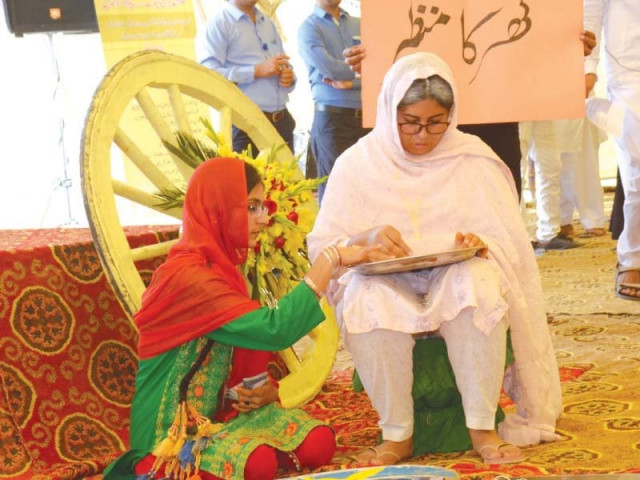Agriculture sector: ‘Only latest techniques can tackle food needs’
UAF VC says researches should hit the fields and benefit farming community

Students perform during a play at farmers’ convention. PHOTO: UAF
These views were expressed by agricultural experts while addressing a farmers’ convention which was held at the University of Agriculture Faisalabad (UAF) Sub-Campus in Burewala, a press release issued on Wednesday stated.
On the occasion, UAF Vice-Chancellor Prof Dr Muhammad Iqbal Zafar said the rational use of fertiliser as per soil fertility analysis will not only decrease cost of production up to 35%, but also help the country save Rs300 million a year. He said only by using balanced fertiliser, a farmer could enhance his yield by up to 32% in cotton, 40% in maize, 35% in wheat, 20% in rice and about 10% in sugarcane. “It will help raise the income of farmers and have a positive impact on their socio-economic life.”
“Researches should reach the fields to benefit the farming community and for this purpose, we are strengthening our outreach programme.”
Iqbal Zafar pointed out that education works as the engine of growth for the development of any institution.
He said the varsity was in the process of expanding its outfits in far-flung areas of the province to provide higher education to the youth at their doorstep. The VC thanked the political hierarchy of the district and support of the district government in establishing the sub-campus.
Faisalabad university expels 3 students for criticism on Facebook
While addressing the convention, Principal Investigator of Fertiliser Project Dr Muhammad Rashid said the UAF had developed a mobile application, enabling farmers to get the desired yield.
“Inputs are very expensive so we need to put fertiliser as precisely as we can. We have developed a fertiliser model for all major crops so that the farmers can save fertiliser and money,” he added.
He maintained the university was providing advisory services in all districts of the province to make the farmers aware of the new fertiliser model. Similarly, Dr Abdus Salam said that over the years, per acre yield had increased manifold, but precise use of inputs was essential, keeping in view the challenges.
He urged the farmers to apply rational fertiliser to make agriculture sustainable. He said that Vehari was producing more cotton than Sindh a few decades ago.
“In the UAF sub-campus, the enrollment has surpassed 1,600 students and they were devising a plan to expand the degree programmes,” Abdus Salam said. He continued that 600 students were getting free education at the sub-campus.
He mentioned that in the undergraduate programmes, BSc Agriculture, BS Computer and BBA Agri Business were being offered. Whereas, in the postgraduate, seven degree programmes, including Horticultural Sciences, Soil Sciences, Environment, Sociology, Computer Sciences and others were catering the needs of higher education of the locals at their doorstep.
‘Expelling students is against freedom of expression’
District Council Chairperson Pir Syed Ghulam Mohyuddin Chishti said that all-out efforts were being made to address the problems of farming community with a number of initiatives.
Cotton Research Institute Director Dr Sagheer Ahmad, while explaining the causes of cotton reduction in 2015, said that pink bollworm attacks and high temperature coupled with heavy rainfall were the major reasons for producing low yield of 10 million bales against the usual annual production of 15 million bales.
He said that steps were being taken to cope with the situation of climate changes that was playing havoc with the lives of the people. He said, “The country is blessed with four seasons, cropping pattern etc but we have adopted modern trends to compete with rest of the world.”
Meanwhile, farmers’ representative Kashif Khaqwani said that the progress made in the agriculture helped us to ensure food security.
Published in The Express Tribune, March 15th, 2018.



















COMMENTS
Comments are moderated and generally will be posted if they are on-topic and not abusive.
For more information, please see our Comments FAQ